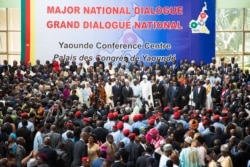English-speaking Cameroonians came out in huge numbers on Oct. 1 to celebrate what they call their independence day, declared by separatist leaders in 2017.
"We are celebrating our independence," said Godlove Azeng, 31, "and at the same time asking the president of Cameroon, Paul Biya, to remove his military from our territory and asking him to free our leader [Julius] Ayuk Tabe who is jailed in his country."
Separatist leader Ayuk Tabe was arrested in Nigeria with 47 of his supporters and extradited to Cameroon in January 2018. In August, he was given a life sentence by a military tribunal in Yaounde that found him guilty of crimes including secession and hostilities against the state.
The Oct. 1 celebrations marked the second anniversary since separatists in Cameroon's Northwest and Southwest regions proclaimed an independent state they call Ambazonia.
During the gatherings, nine people were reported killed in gun battles with the military in Kumbo, the Northwest villages of Kikaikom and Mbveh, and the Southwest towns of Kumba and Mamfe.
Deben Tchoffo, governor of the English-speaking Northwest region, says government troops are deployed to protect citizens and Cameroon's territorial integrity.
"Most of those areas have been secured by our security forces," Tchoffo said. "Cameroon is ruled by laws and regulations and we are going to take our responsibility to secure the villages and while waiting, I am asking the population of the Northwest region to remobilize themselves [against those who want separation]."
The U.N. reports that the separatist war has forced more than 530,000 people to flee their homes since the conflict erupted in late 2017. It says at least 2,000 civilians and 300 defense and security forces have lost their lives in the war.
National dialogue
A government-run dialogue ordered by Biya and aimed at resolving the separatist crisis is under way in Yaounde.
Separatist backers who live outside Cameroon refused to attend, demanding the government first release Ayuk Tabe and accept negotiations led by the Swiss government.
On social media, they say no talks can start until Biya withdraws troops from English-speaking regions of Cameroon as a sign he has accepted their independence.
Political analyst and U.S.-based Cameroonian Humphrey Nsonka, who is taking part in the national dialogue, says it is unfortunate Cameroon is not doing enough to quell the anger of English-speakers in the country, where French is the majority language.
He says the best option for Cameroon is a federal state, a concept the government rejects in favor of decentralization.
"The huge numbers of people that came out in almost all the villages and towns is an indication of how much English-speaking Cameroonians are disgruntled with the domineering attitude of the French majority," Nsonka said. "I think Cameroon should consider [a] federal state with the Anglophones on one part and French speakers on the other."





